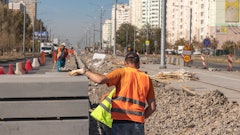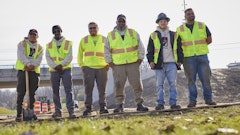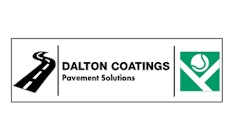Contract sweepers throughout the country have grown increasingly frustrated in recent years as they are dragged into lawsuits by property managers and owners over issues which are clearly not the responsibility of the sweepers.
According to Scott Cerosky, Crum & Forster Insurance, this has happened largely because property owners and managers have used their contracts with contractors to gradually transfer risk from the property owners and managers to just about any entity – such as sweeping contractors and snow removal contractors -- that has occasion to work on the property.
The lawsuits involved are notably slip-and-fall cases, and as more and more lawsuits are brought, insurance rates for sweepers have skyrocketed, making it increasingly difficult to run a reasonably priced, profitable sweeping business.
About two years ago the North American Power Sweeping Association (NAPSA) decided something had to be done. This fall NAPSA will reach a key milestone in its development of an American National Standards Institute (ANSI) standard that would define “best practices” and “scope of work” for the power sweeping industry.
Once developed and adopted, the ANSI standard will provide a basis from which contracts can be negotiated and will provide contractors with a level of protection against the frivolous lawsuits that have become the bane of the sweeping industry.
“NAPSA’s goal is to bring something to the industry that will benefit the contractors and create a more level playing field,” says NAPSA board member David McCaskill, Accusweep & Landscape Inc., Columbia, SC. “It’s a long process and even though we have a good ways to go we’ve made a lot of progress.”
NAPSA committee member Jay Presutti, East Coast Industrial Services, Pine Bush, NY, says that when a sweeper (or really any contractor) is included in a lawsuit, one of the first things the attorneys ask is “Are there any industry standards out there that represent the industry?” The next thing they ask is “Did the contractor follow those standards?”
Once an ANSI standard is approved the answer to the first question will become Yes, and then contractors who are ANSI certified can demonstrate how they fulfilled their part of the contract as they should have – according to the ANSI standard -- and that other issues (such as slip-and falls) are someone else’s problem.
But until a standard is developed and adopted, sweepers are almost at the mercy of their clients, essentially forced to sign contracts that transfer virtually all risk to the contractor whether or not the contractor’s work played a role in an accident. That’s because property managers and owners put language in their contracts that transfers liability to sweeping, snow removal and other contractors.
“The property owners’ risk managers have done their job and created contracts that transfer risk to the contractor,” Cerosky says. “Our industry has been remiss but now that insurance costs are rising so dramatically and more and more sweepers are getting involved in frivolous lawsuits it’s time to do something.
“We’re looking to standardize language and to mitigate exposure via the contract,” Cerosky says. “We want to make sure the contract is predicated only on the scope of work the contractor is hired to perform, and developing this ANSI standard is our mechanism to do that. Once it’s approved we will be in a position to be able to negotiate terms down the middle in these contracts, but it will all be based on scope of work.”
Status of the Standard
Nancy Terry, NAPSA executive director, says develop of an ANSI standard is a complex, multi-faceted process that NAPSA has been pursuing for some time. She says NAPSA is “taking a lot of care” to make sure the standard they’re writing is “global and very baseline” that encompasses processes and procedures all sweepers should be following. That way any contract sweeper can become ANSI certified to help protect the company from frivolous lawsuits and help reign in insurance rates.
The NAPSA members spearheading the development of the standard are Cerosky, McCaskill, Presutti and Gabe Vitale, C & L Sweeper Service, Jackson, NJ and they’ve been working on several aspects of development of the standard simultaneously.
“The first thing we need to do is get approved by ANSI as an organization that is able to write ANSI standards,” Presutti says. “We’re ready to submit everything we need to for that.”
In the meanwhile the team has also drafted what they hope to be the standard ANSI eventually will adopt and has sent the draft to NAPSA members throughout the country to review and comment. Once ANSI approves NAPSA as a certified standard writer, NAPSA expects to be ready to submit the standard to ANSI for approval.
Presutti says NAPSA is piggybacking on work done by the Accredited Snow Contractors Association (ASCA) which has encountered problems similar to those facing the power sweeping industry.
“We can compare what we’re going through regarding frivolous slip-and-fall lawsuits with what the snow industry has gone through and we can learn from what they’ve done,” Presutti says. “Basically snow removal contractors got pulled into frivolous slip-and-fall cases because of contract language that transfers risk to the contractor rather than the property manager or property owners. We’re seeing the same issues in the sweeping industry.”
Presutti says that what the snow removal industry learned is that for there to be any legitimate reform and relief on contractual liability for slip-and-fall claims, there had to be a basis for defense. The ASCA learned, and what NAPSA is following, is that adoption of an industrywide “best practices” standard can provide that defense.
“We are writing a standard that could be adopted by the power sweeping industry that kind of becomes case law,” Presutti says. “The idea is it’s a national standard that defines how sweeping should be done.”
ANSI Certification Open to All Sweepers
Once adopted by ANSI, sweeping companies who want to receive ANSI certification will have to become ANSI certified through NAPSA, and the current plan is to require recertification each year.
“We want everyone in the industry to have access to ANSI certification,” McCaskill says. “It would not be mandatory but it would be accessible industry-wide. The whole intent is to normalize professionalism in the industry so that those companies that get certified aren’t as susceptible to these kinds of lawsuits. We want everyone to have access to it and we think that once people realize what it is and the benefits, that becoming ANSI certified will become an industry best practice.”
Presutti says a side benefit of NAPSA developing the ANSI standard could be growth in NAPSA membership. That’s because getting the standard adopted would clearly be a feather in the cap of the association and also because NAPSA members would pay less to become ANSI certified and to get recertified.
“We think it will get people to jump on something to help change the industry and hopefully they would join our association,” Presutti says.
“We’re trying to combat this situation,” Presutti says. “We’re never going to get the retailers and property managers to change their terms. But we’re looking to create a level playing field by establishing a standard of performance. Once these big box companies run out of places to go to get their sweeping done things are going to change.
“That’s already happened in the snow industry big time. It’s actually starting to shock-wave itself through the snow industry,” Presutti says. “It’s our way of getting the playing field level.”



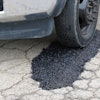


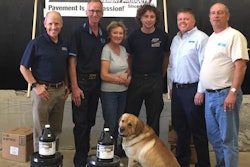

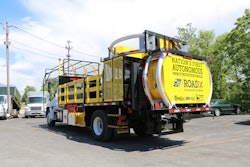

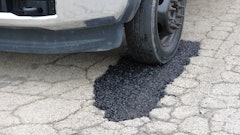

![Lee Boy Facility 2025 17 Use[16]](https://img.forconstructionpros.com/mindful/acbm/workspaces/default/uploads/2025/09/leeboy-facility-2025-17-use16.AbONDzEzbV.jpg?ar=16%3A9&auto=format%2Ccompress&fit=crop&h=135&q=70&w=240)


